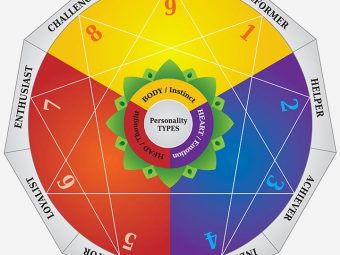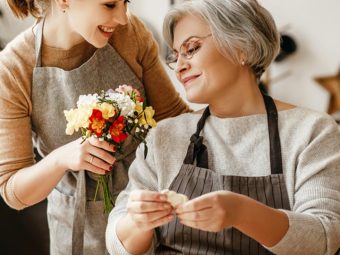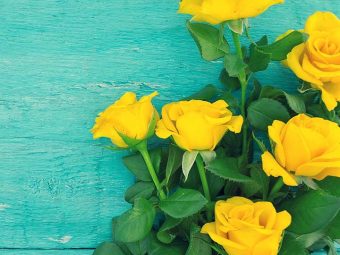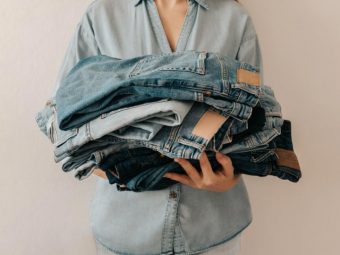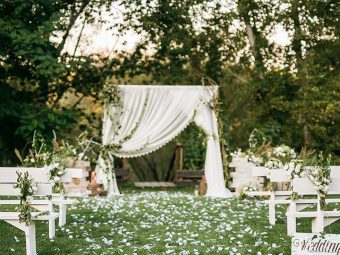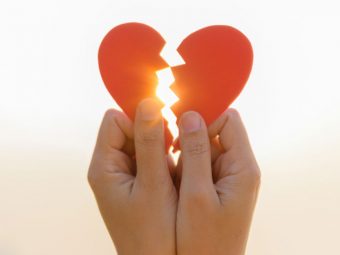5 Best Home Remedies For Cystic Acne | Causes And Prevention
Your handy guide to learn about the symptoms of and remedies for this painful skin condition.
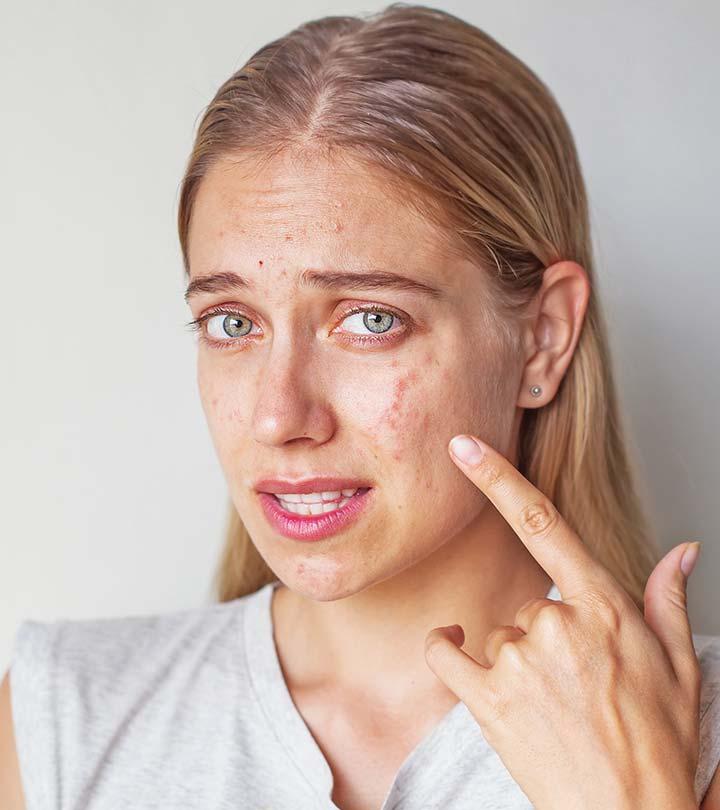
Cystic acne is painful that requires medical treatment. It is a severe condition of acne that may leave permanent scars if you do not treat it on time. Though it is best to consult a dermatologist, you can also try some home remedies to manage this condition. These homemade remedies will help treat the inflammation and manage the irritation. This article discusses cystic acne, home remedies to treat it, and other treatment options available. Keep reading!
In This Article
How To Identify Cystic Acne
Cystic acne is a severe form of acne (1). It is formed deeper within the skin and is larger than any other form of acne. The cysts have a smooth surface and appear a bit shinier due to the tightness of the skin. Cystic acne usually appear on the face, neck,
back, chest, arms, and behind the ears. It occurs as painful large pus-filled white bumps. Redness and inflammation are other identifying characteristics of this condition. Cystic acne usually leaves permanent deep pits (ice pick scars) or shallow depressions on the skin.
From hormonal changes in puberty to using certain skin care products, several reasons can trigger cystic acne. Scroll down to know more about it!
Causes Of Cystic Acne
Acne is caused when dirt, impurities, sebum, and bacteria get trapped in the skin pores, leading to inflammation. When the infection is deep, and the inflammation is severe, cysts or nodules are formed.
The hormonal changes in adolescence are a major factor behind cystic acne. High androgen levels may increase sebum production and clog the pores, trapping dirt and bacteria. Other factors that may trigger cystic acne include:
- Hormonal fluctuation during pregnancy, menstrual cycle, and menopause
- Certain medications like corticosteroids, birth control pills, and hormonal therapies
- Certain chemicals in skin care products
- Genetics and conditions like polycystic ovary syndrome (PCOS)
Cystic acne is problematic and needs immediate attention and care. Find some of the best natural ways to soothe painful cystic acne below.
Home Remedies For Cystic Acne
Note: These remedies will not treat cystic acne. They may only help in soothing the inflammation.
1. Baking Soda
You Will Need
- 1-2 tablespoons of baking soda
- 1 tablespoon of water
What You Need To Do
- Mix the ingredients to form a paste.
- Apply it to the affected areas and leave it on for a minute.
- Wash it off with lukewarm water and pat dry.
- Follow up with a moisturizer.
How Often?
Once or twice a week.
Why This Works
Baking soda fights acne-causing bacteria and dries up excess sebum to reduce the inflammation (2). Apply the paste to the affected area in slow, circular motions.
2. Apple Cider Vinegar
You Will Need
- 1 tablespoon of raw apple cider vinegar
- Cotton buds
- 1 tablespoon of water
What You Need To Do
- Dilute the ACV with water.
- Apply the mixture with the cotton bud as a spot treatment.
How Often?
Do this twice a day.
Why This Works
Apple cider vinegar is said to balance the skin pH, helping maintain its acid mantle and soothing the inflammation.
3. Epsom Salt
You Will Need
- 2 tablespoons of Epsom salt
- 1 ½ tablespoons of baking soda
- Warm water
What You Need To Do
- Mix the ingredients to form a paste.
- Apply it as a spot treatment to the affected areas and let it dry for a few minutes.
- Wash it off with warm water.
How Often?
Do this every alternate day.
Why This Works
Epsom salt has pain-relieving properties and is often used in traditional remedies. It may help reduce swelling and pain and provide relief. This remedy works best for oily to combination skin types.
Caution: The paste can dry the skin. Seek medical help if you experience irritation.
4. Neem Oil
You Will Need
- 2-3 drops of pure neem oil
- Cotton pads
What You Need To Do
- Clean your face and apply neem oil with a cotton pad to the cystic acne.
- Leave it on overnight and wash it off in the morning.
How Often?
Do this two to three times a day.
Why This Works
Neem oil is used as an alternative remedy for acne (3). It may help reduce inflammation and redness associated with cystic acne.
5. Witch Hazel
You Will Need
- 1 teaspoon of witch hazel
- Cotton ball
What You Need To Do
- Dab the cotton ball soaked in witch hazel on the cleansed affected areas.
- Leave it on.
How Often?
Use it twice or thrice every day as a toner after you wash your face.
Why This Works
The antiseptic and astringent properties of witch hazel can soothe acne and reduce inflammation (4).
Home remedies may only help manage the redness and inflammation. You need proper treatment for cystic acne. Check out the over-the-counter treatment methods available for cystic acne below.
Treatments Options For Cystic Acne
1. Retinoids And Isotretinoin
Retinoids and isotretinoin are vitamin A derivatives and potent prescription medications for cystic acne (5), (6). These are usually available in the forms of creams, lotions, and ointments.
Doctors often prescribe oral Accutane for treating severe cystic acne. However, avoid taking this if you are pregnant, as it may cause birth defects. Other potential side effects include mood disorders, liver problems, dry eyes, blood in urine, increased skin sensitivity to the sun, and muscle or joint pains (7). Hence, talk about all possible side effects with your doctor before starting the medication.
2. Oral Antibiotics
Oral antibiotics can treat severe inflammatory acne. These are often combined with topical retinoids and benzoyl peroxide to reduce inflammatory and comedonal lesions.
Antibiotics like tetracyclines (doxycycline and minocycline) and macrolides (azithromycin and erythromycin) have antibacterial effects and reduce the proliferation of acne-causing bacteria (8). Oral antibiotics also cause some side effects, including sun sensitivity, vomiting, abdominal pain, diarrhea, and nausea. Consult your doctor before using them.
3. Spironolactone And Corticosteroids
Spironolactone is a steroid used for treating severe acne. Studies found that a dose of 50 to 100 mg per day could reduce excess sebum production and reduce inflammation (9).
Spironolactone and corticosteroids can regulate excess androgen levels and reduce acne inflammation. This treatment is often prescribed for treating hormonal acne. However, it may cause breast enlargement in men (10). Also, if you are pregnant, consult a doctor before taking steroids and spironolactone.
4. Oral Contraceptives
Oral contraceptives are a viable option for controlling hormonal fluctuation and acne. Birth control pills balance estrogen levels, decrease androgen levels, and reduce sebum production to reduce acne (11). However, these are not suitable for everyone.
Avoid oral contraceptives if you smoke, have blood clot issues, or trying to get pregnant. Women may experience side effects like breast tenderness, increased vaginal discharge, abdominal cramping, nausea, and headaches (12). It may rarely cause adverse effects like blood clots and heart attacks, especially in women over 35 years.
5. Benzoyl Peroxide
Benzoyl peroxide is available as cleansing liquids and bars, lotions, creams, and gels. It is a bactericidal, keratolytic (breaks down outer layers of skin), and comedolytic (prevents comedone formation) agent. It also has anti-inflammatory properties that reduce acne-causing bacteria and prevent new lesions (13), (14).
Alcohol-based formulations of benzoyl peroxide have a drying effect, making them suitable for oily skin. However, excessive use of benzoyl peroxide may cause skin irritation.
Apart from systemic treatments and home remedies, the following tips can help you prevent or reduce the risk of worsening your acne.
How To Prevent Cystic Acne
- Cleanse your face twice a day. Avoid using rough scrubs, strong cleansers, and soaps. Use a gentle cleanser in the morning and before sleeping. Rinse your face with lukewarm water.
- Wear sunscreen to prevent sunburns and tanning.
- Avoid touching, scratching, and rubbing the acne lesions.
- If you have an oily scalp, shampoo your hair regularly.
- Use non-comedogenic and oil-free skin care products.
Cystic acne is different from the normal pimples you get. It is a severe type of acne that requires medical treatment. Otherwise, it may leave permanent scars on your face. Hormonal changes, medications, certain skin care products, genetics, and PCOS may cause cystic acne. The home remedies discussed in the article may help you soothe cystic acne and soothe the skin. You may also consult your dermatologist to identify the underlying medical condition to determine which treatment suits you the best.
Frequently Asked Questions
Can you pop cystic acne?
No. Popping cystic acne can introduce more bacteria into the pore, worsening the infection.
Does cystic acne go away?
No. Cystic acne may improve with treatment, but it won’t go away.
How long does cystic acne last?
With proper treatment, you may expect cystic acne to improve by 8-12 weeks. However, the recovery depends on the severity and may leave behind scars.
Does stress cause cystic acne?
Yes. Stress can trigger your oil glands and cause an acne flare-up (1).
Sources
Articles on StyleCraze are backed by verified information from peer-reviewed and academic research papers, reputed organizations, research institutions, and medical associations to ensure accuracy and relevance. Read our editorial policy to learn more.
- Acne: more than skin deep
https://www.ncbi.nlm.nih.gov/pmc/articles/PMC2585707/ - ACNE-CAUSES AND AMAZING REMEDIAL MEASURES FOR ACNE
https://www.researchgate.net/publication/340874478_ACNE-CAUSES_AND_AMAZING_REMEDIAL_MEASURES_FOR_ACNE - A review of diagnosis and treatment of acne in adult female patients
https://www.ncbi.nlm.nih.gov/pmc/articles/PMC5986265/ - Antioxidant and potential anti-inflammatory activity of extracts and formulations of white tea rose and witch hazel on primary human dermal fibroblast cells
https://www.ncbi.nlm.nih.gov/pmc/articles/PMC3214789/ - Management of severe acne
https://pubmed.ncbi.nlm.nih.gov/25597508/ - Why Topical Retinoids Are Mainstay of Therapy for Acne
https://www.ncbi.nlm.nih.gov/pmc/articles/PMC5574737/ - Acne
https://www.womenshealth.gov/a-z-topics/acne - Oral Antibiotic Therapy for Acne Vulgaris
https://www.ncbi.nlm.nih.gov/pmc/articles/PMC3050614/ - Oral Spironolactone in Post-teenage Female Patients with Acne Vulgaris
https://www.ncbi.nlm.nih.gov/pmc/articles/PMC3315877/ - STUBBORN ACNE? HORMONAL THERAPY MAY HELP
https://www.aad.org/public/diseases/acne/derm-treat/hormonal-therapy - Oral contraceptives in the treatment of acne
https://pubmed.ncbi.nlm.nih.gov/11242137/ - Oral Contraceptive Pills
https://www.ncbi.nlm.nih.gov/books/NBK430882/ - Management of acne
https://www.ncbi.nlm.nih.gov/pmc/articles/PMC3080563/ - ACNE VULGARIS TREATMENT : THE CURRENT SCENARIO
https://www.ncbi.nlm.nih.gov/pmc/articles/PMC3088940/





